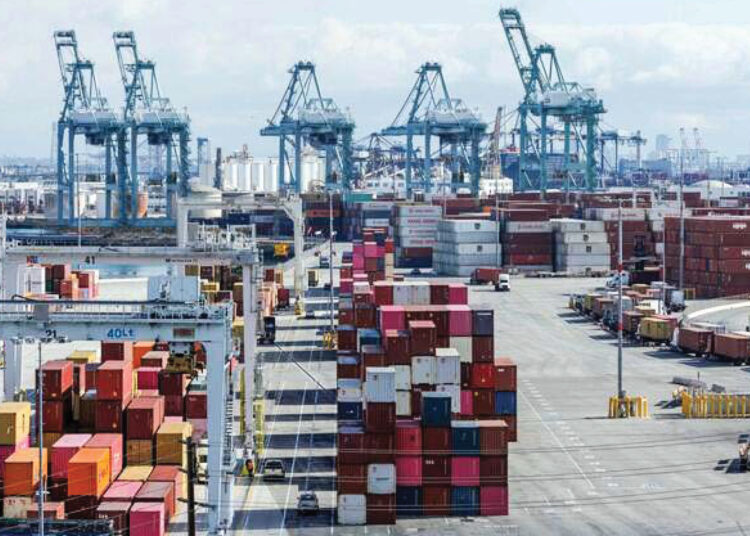The global community is on the brink of economic recession following the torrents of tariffs US President Donald Trump slammed on many countries with which it has trading relations in varying degrees.
Barely a week after Trump announced the sweeping tariffs, no fewer than 64 countries affected have reportedly responded with counter-tariffs while some are still open to negotiation for a favourable trade term with the US.
On Wednesday, the US President intensified the tariffs on China to 125% “effective immediately”, up from the initial 104% it earlier imposed on the second-largest economy in the world.
“At some point, hopefully shortly, China will realise that the days of ripping off the USA, and other countries, is no longer sustainable or acceptable,” the US president wrote on the social media platform Truth Social.
Beijing did not take it lightly and retaliated by also raising its tariffs against the US to 84%.
The European Union, made up of about 27 countries, has also imposed tariffs on US goods.
Trump also announced a 90-day pause on the implementation of new tariffs, beckoning Americans to remain calm in the uncertainty surrounding his tariff policies, which have triggered protests in many US cities.
China, however, refused to back down after being hit with the new tariff from Trump, even as Beijing has already filed a complaint to the World Trade Organisation, saying the US is violating international trade laws.
The trade in goods between the two economic powers added up to around $585bn (£429bn) last year, though the US imported far more from China ($440bn) than China imported from America ($145bn). That left the US running a trade deficit with China – the difference between what it imports and exports – of $295bn in 2024. That’s a considerable trade deficit, equivalent to around 1% of the US economy. But it’s less than the $1trn figure that Trump has repeatedly claimed this week.
Meanwhile, the EU on Wednesday voted to impose new tariffs on some American goods from 15 April – affecting €20.9bn (£18bn) worth of goods – to be implemented in three stages throughout the year.
EU tariffs on the US will come into effect in three phases, the first set coming into effect on Tuesday next week on €3.9bn worth of goods the US sells to EU countries.
A month later, on 15 May, another €13.5bn of goods will be impacted, followed by a further €3.5bn from 1 December.
These tariffs are in response to the 25% import taxes President Trump imposed on all steel and aluminium, which came into force in mid-March.
They applied to both the EU and the rest of the world.
Hungary was the only one of the 27 EU member states to vote against imposing tariffs on the US. Prime Minister Viktor Orban has long been seen as a close ally of President Trump, but he also has domestic pressures to consider when it comes to tariffs.
On social media, the minister for foreign affairs and trade, Peter Szijjarto, said: “Such measures would cause further damage to the European economy and citizens by raising prices. The only way forward is negotiations, not retaliation.”
Meanwhile, European stock markets sustained losses across the major indexes on Wednesday. In France, the Cac 40 ended down 3.34% after falling 2.3% at opening this morning.
The German Dax closed 2.96% lower this evening after opening to losses of 2.1%. This comes just as the UK’s FTSE 100 finished for the day at a 13-month low with a fall of 2.92%. It had opened at 2.5% down.
Incoming German Chancellor Friedrich Merz has said that Europe can rely on his country and called for a joint response to Trump’s tariffs.
Merz accused Trump of unleashing new turbulence in financial markets, warning that “we don’t know where that leads”.
“Germany will fulfil its obligations in terms of defence, and Germany is willing to strengthen [our] own competitiveness,” he added during an event at which he presented his new coalition’s priorities.
Canada, which is impacted by the 25% tariffs on cars and metals, as well as other goods outside of the free trade agreement it has with the US and Mexico, has responded with a range of tariffs, including 25% on certain cars coming from the US, and billions of dollars worth of US goods.
The Trump tariffs have sparked a crisis in the energy sector, with oil prices crashing. WTI crude oil plummeted to $55.60 a barrel, down 6.68%. Brent crude oil, which is usually used as a global benchmark of oil prices, fell to $58.84 at one point, a 6.34% drop.
The price per barrel continued to fluctuate throughout Wednesday. At certain points, it rose slightly above $60 before falling back down.
This development might be cruel for many people worldwide as crude oil prices impact everyday items like petrol for your car. Experts said the plummeting oil prices will also affect the cost of shipping imported goods, heating homes, and production costs for energy-intensive industries.
And for Nigeria, which benchmarked its 2025 budget at $75 a barrel, it means a revenue squeeze to carry out government activities.





